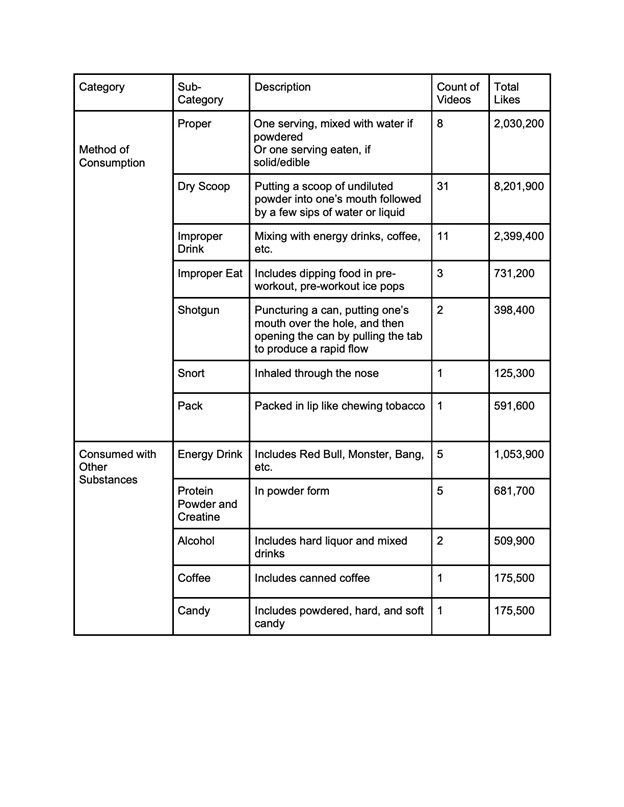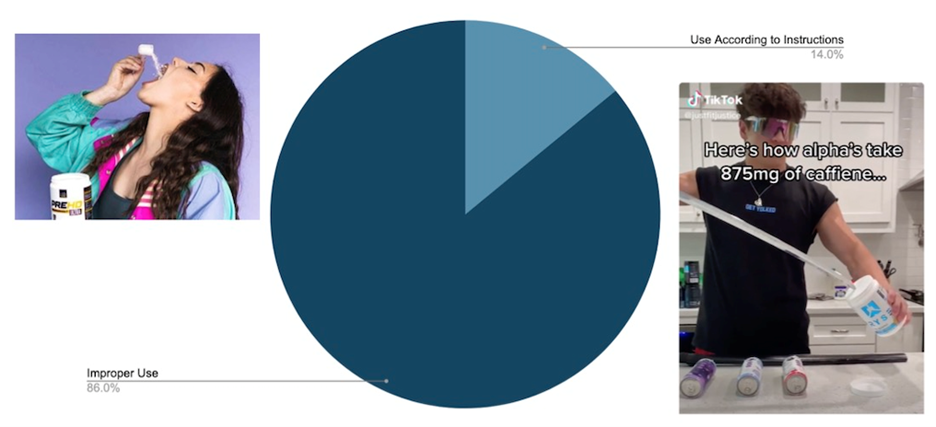The study abstract analyzes videos and the number of “likes” that indicate millions of viewers in research to be presented at the 2021 American Academy of Pediatrics National Conference & Exhibition
ITASCA, IL – A potentially deadly new challenge called “dry scooping” is prevalent on the internet, and new research shows video demonstrations on one social media platform popular among teens amassed more than 8 million views. Dry scooping refers to the improper use of pre-workout supplements, a powder typically added to liquid and containing ingredients that are unsuitable for children.
The study abstract, “Dry Scooping and Other Dangerous Pre-Workout Consumption Methods: A Quantitative Analysis,” will be presented during the American Academy of Pediatrics 2021 National Conference and Exhibition. The research reviews the improper use of pre-workout supplements, which pose risks to children of respiratory or cardiovascular distress or death.
"It can be difficult for physicians to identify novel trends that may pose health hazards among youth. Take for instance the current pervasiveness of pre-workout and the dangerous methods of its consumption,” said abstract author Nelson Chow, a Princeton University student and Developmental and Behavioral Pediatrics Research intern at Cohen Children's Medical Center. “Sometimes investigating unorthodox platforms like TikTok can yield valuable results."
Videos featuring dry scooping, a method of consumption in which an individual puts a scoop of undiluted powder into their mouth followed by a few sips of water or liquid amassed over 8 million “likes.” Users were at extremely high risk of overconsumption or accidental inhalation of pre-workout powder. The videos also feature the mixing of pre-workout with substances such as energy drinks and alcohol, according to the research.
The author collected 100 TikTok videos under the hashtag “#preworkout” and analyzed the following data: likes, method of ingestion, number of servings, and combination with other substances. About 64% of the videos featured males, 30% females and 6% both or ambiguous. Only 8% of videos depicted use according to instruction. The most popular substances consumed alongside pre-workout were energy drinks, creatine/protein powder, and alcohol.
The author suggests that physicians should be aware of the pervasiveness of pre-workout, dangerous methods of consumption, and the potential for accidental overconsumption, inhalation, and injury.
Mr. Chow will present the study abstract at 10:30 pm CT Saturday, October 9, 2021.
Please note: only the abstract is being presented at the meeting. In some cases, the researcher may have more data available to share with media or may be preparing a longer article for submission to a journal.
# # #
The American Academy of Pediatrics is an organization of 67,000 primary care pediatricians, pediatric medical subspecialists and pediatric surgical specialists dedicated to the health, safety and well-being of infants, children, adolescents and young adults. For more information, visit www.aap.org.
ABSTRACT
Program Name:
Abstract Title: Dry Scooping and Other Dangerous Pre-Workout Consumption Methods: A Quantitative Analysis
Nelson Chow
Lynbrook, NY, United States
Saturday, October 9, 2021: 10:38 AM –
Pre-workout supplements, or “pre-workouts,” have skyrocketed in popularity in recent years. Taken before exercise, pre-workout is advertised to improve athletic performance and increase energy and focus. Typically, pre-workout is sold in powder form, intended to be combined with water and consumed as a drink. They often contain high concentrations of caffeine mixed with substances such as Beta-alanine, L-Citrulline, and BCAAs. Several pre-workouts have been banned for containing substances such as DMAA and Synephrine. “Dry scooping,” one particularly risky method of consumption, entails putting undiluted powder into one’s mouth followed by sips of liquid. The highly concentrated powder can lead to choking, accidental inhalation, overconsumption, injury, and death. Despite being labeled 18+, pre-workout has become increasingly popular among teens. This study investigates risky behavior associated with underage pre-workout use on the social media app, TikTok, a platform with millions of teenage users.
TikTok videos under the hashtag “#preworkout” were collected. Video content was analyzed and the following data were collected: likes, method of ingestion, number of servings, and combination with other substances. Descriptive analysis was conducted to understand potential trends in the collected data.
Of the videos analyzed (n=100), the cumulative number of likes was 259,773,000 and ranged from 112,300-1,700,000 per video. 64% (n=64) of the videos featured males, 30% (n=30) females, 3% both, and 3% were ambiguous. 31% (n=31) of the videos featured dry scooping (totaling 8,201,900 likes), 11% (n=11) featured users improperly concentrating/mixing pre-workout (totaling 2,399,400 likes), and 7% featured users consuming pre-workout through other dangerous methods (totaling 1,721,200 likes). Only 8% (n=8) of videos depicted use according to instructions (totaling 2,030,200 likes) (Table 1). When excluding videos that do not show consumption, 86.0% (n=49) depicted improper pre-workout use while 14.0% (n=8) depicted use according to instructions (Figure 1). The most popular substances consumed alongside pre-workout were energy drinks (n=5, totaling 1,053,900 likes), creatine/protein powder (n=4, totaling 681,700), and alcohol (n=2, totaling 509,900 likes) (Table 1).
Pre-workouts are supplements advertised to enhance athletic performance, but they often contain ingredients unsuitable for children. On TikTok, dangerous methods of consuming pre-workout were found to be extremely prevalent; videos featuring dry scooping amassed over 8 million likes. This may mislead millions of impressionable minors into improper use of pre-workout, which could lead to respiratory or cardiovascular distress and/or death. Physicians should be aware of the pervasiveness of pre-workout, dangerous methods of consumption, and the potential for accidental overconsumption, inhalation, and injury.
Table 1: Classifications of Consumption.

Figure 1: Usage According to Recommendations.

Of the videos which explicitly showed or described a specific instance of pre-workout ingestion (n=57), 86.0% (n=49) depicted improper use (e.g. dry scooping, multiple servings at once, mixing with energy drinks) compared to 14.0% (n=8) depicting use according to instructions (e.g. one serving, mixed with water if powdered).